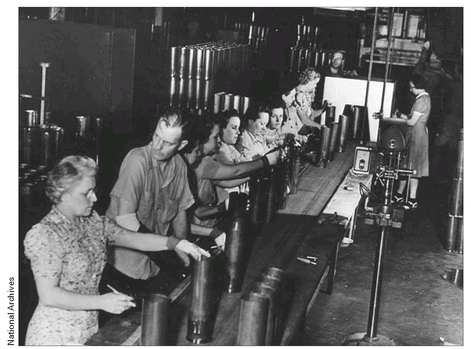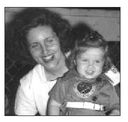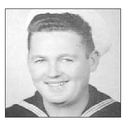War Stories III (29 page)
Authors: Oliver L. North

With a workforce bolstered with women like Phyllis McKey and Lourelei Prior, the U.S. began to turn out massive quantities of war materielâoverwhelming Hitler and his Axis partners. American farms and industry not only fed and equipped our own rapidly growing armed forces for a two-front war, but did the same for our allies.
When the Americans, British, and Canadians stormed the beaches at Normandy, nearly 30 percent of the food being consumed by the British people originated on American farmsâabout the same proportion as the bombs and ammunition being used by His Majesty's military. By then, British pilots were flying American-built transport aircraft, every British armored unit was fighting in American-made Sherman tanks, and nearly all of the landing craft that would put them ashore were produced in the U.S.
It was the same for the Soviets. Though the Red Army generally eschewed American aircraft and armor, they still accepted more than 14,500 planes and nearly 7,000 tanksâalong with 375,000 trucks, fifteen million pairs of boots, millions of gallons of fuel, more than 2,000 locomotives, and 10,000 freight cars.
Â
Women kept the home front running as they became the primary workforce.

By 1944, American shipyardsâlike the one where Phyllis McKey workedâwere turning out Liberty ships in mere days, and warships in a matter of weeks. That same year, America's aircraft plants produced more than 95,000 transports, fighters, and bombers.
Victory gardens, like the one Lourelei Prior had, were so successful that by 1945, some twenty million of them produced approximately 40 percent of America's vegetables. Despite the shortages and sacrifices that most Americans experienced, the U.S. standard of living actually
rose
between 1940 and 1945.
rose
between 1940 and 1945.
Though food and other commodities were in short supply during the war, the greatest shortage was simple: men. The absence of so many menâmore than twelve million were off in uniformâaffected not only war production, but it also effectively shut down the American pastime. By 1942, professional baseball had lost so many players who either enlisted or were drafted into the military service that there were too few left for the games to go on. That's when women stepped up to the plateâliterally.
The Wrigley family decided that those on the “Home Front” needed some respite from the day-to-day labor of war production, and created the All American Girls Baseball League. One of the teams that Lourelei Prior got to watch, the Fort Wayne Daisies, had an all-star pitcher: Dottie Collins.
DOTTIE COLLINS
Fort Wayne Daisies
14 May 1945
14 May 1945

My dad was a big baseball fan and taught me to throw a curveball when I was a kid. I was five feet seven inchesâtall for a girl in the '40sâand when the Wrigley family started up the league, one of the scouts had me
throw some pitches. After I tried out, they offered me a jobâpitching for the Fort Wayne Daisies.
throw some pitches. After I tried out, they offered me a jobâpitching for the Fort Wayne Daisies.
The idea of a women's league was a good one. Because all the men were gone, there were empty ballparks all over the country. And everybody knows that being outside at a ballpark on a summer afternoon is healthy. Starting a league of women ball players seemed like a good way to get people outside in the fresh air and have some good, all-American fun. It was also a good way to use something that was entertaining to help keep up morale and raise money for war bonds at the same time.
When the league was formed a lot of us tried out and the competition was pretty fierce. Many of the girls had played in school or college, but I was the only one with a curveball. And I did all rightâI had a career record of 117 wins and 76 losses with a 1.83 earned run average.
Our coaches were all professionals and told us right from the start that we were “ladies first.” Of course
our
theory was, if you're going to play baseball, you can't be a lady. But in addition to practice in batting, fielding, base running, how to steal and slideâall the stuff of making a good baseball playerâwe also had to do things like walk with a book on our heads to teach us poise, the right way to wear make-up, and how to act like ladies. We traveled all around the Midwest and were very carefully chaperoned. When we weren't on the field we were told to use proper manners and etiquette and dress “like a lady.”
our
theory was, if you're going to play baseball, you can't be a lady. But in addition to practice in batting, fielding, base running, how to steal and slideâall the stuff of making a good baseball playerâwe also had to do things like walk with a book on our heads to teach us poise, the right way to wear make-up, and how to act like ladies. We traveled all around the Midwest and were very carefully chaperoned. When we weren't on the field we were told to use proper manners and etiquette and dress “like a lady.”
The people who ran the Women's Baseball League insisted that everything we did be geared to entertainment. From the moment we arrived in town for a game, everything was carefully orchestrated. There were press conferences and lots of cameras as we got off the busâand then out on the field during warm-upâjust like in Major League Baseball. Even the way we dressed was part of the production.
Just before our first game they handed out our uniformsâthey were these one-piece, sleeved dressesâthat were hemmed below the knee. When we said, “How do you play baseball in a dress?” we were told, “You either wear this uniform or you don't play.” Well, by the second game,
most of us had shortened themâthough about all we could get away with was a hem right about the middle of the knee.
most of us had shortened themâthough about all we could get away with was a hem right about the middle of the knee.
Let me tell you, sliding into home plate wearing a dress can be a very painful experience. But as you might imagine, our male fans were very enthusiastic. We had a lot of funâand in our own way did our part for the war effort on the home front.
Though continental America's “Home Front” was far more secure than that of any other combatant nation in World War II, it was not completely immune to enemy action. Both the Japanese and the Germans attempted attacks on the U.S. mainland, but only the Japanese succeeded.
On 23 February 1942, a Japanese submarine surfaced a few hundred yards off Ellwood, near Santa Barbara, California, and shelled a coastal oil storage facility. There were no casualties and only minor damage to a small shed.
The Japanese also tried attaching incendiary and explosive devices to hydrogen-filled balloons and launching them into the jet stream. Several caused nothing more than minor forest fires along the West Coast. But in May 1945, one of these “balloon bombs” killed the wife and all five children of the Reverend Archie Mitchell when they inadvertently detonated the hellish device after discovering it in a meadow during a picnic, 200 miles from the Oregon coastline.
Hitler was even less successful than the Japaneseâthough the Nazis claimed otherwise. On 9 February 1942, the French liner
Normandie,
in the process of being converted into a troop ship, burned and sank at Pier 88 in New York Harbor. Paul Goebbels, the Führer's loyal propaganda minister, fed suspicions that the ship was the victim of German saboteurs. A lengthy investigation concluded that the fire and subsequent sinkingâby water intended to put out the blazeâwere the consequence of negligence and incompetence rather than Nazi malevolence.
Normandie,
in the process of being converted into a troop ship, burned and sank at Pier 88 in New York Harbor. Paul Goebbels, the Führer's loyal propaganda minister, fed suspicions that the ship was the victim of German saboteurs. A lengthy investigation concluded that the fire and subsequent sinkingâby water intended to put out the blazeâwere the consequence of negligence and incompetence rather than Nazi malevolence.
Yet the Germans did tryâat great risk to their agentsâto conduct espionage and terror operations inside the U.S. Shortly after declaring war on the United States, Hitler ordered the Abwehr, Germany's intelligence
service, to land saboteurs by U-boat along the East Coast to conduct attacks on defense plants, railroads, and bridges, and to spread panic by putting time-release bombs in movie theaters and other places where the American public congregated. During May and June of 1942, two Abwehr sabotage teams were landed on the coast of Florida and on Long Island. Had it not been for an alert Coast Guardsman named John Cullen, the German agents might well have succeeded.
service, to land saboteurs by U-boat along the East Coast to conduct attacks on defense plants, railroads, and bridges, and to spread panic by putting time-release bombs in movie theaters and other places where the American public congregated. During May and June of 1942, two Abwehr sabotage teams were landed on the coast of Florida and on Long Island. Had it not been for an alert Coast Guardsman named John Cullen, the German agents might well have succeeded.
JOHN CULLEN, USCG
Amagansett Lifeboat Station
13 June 1942
13 June 1942

In the summer of '42, I was just twenty-one years old and had been in the Coast Guard just six months. I was stationed at Amagansett Lifeboat Station, on Long Island. There were about fifteen of us there. We did lifeboat training, and patrolled a three-mile stretch of beach every night.
I used to walk down by the surf, where I could make better time. On the night of 13 June, I was on patrol, maybe 200 yards from the lifeguard station, when I saw two men, just above the high water line.
I called out and asked, “What are you doing?” And one of these guys turned and walked toward me. He said, “We're fishermen and our boat ran aground. We intend to stay here until daybreak.”
I said, “That's hours away. Why don't you come up to the Coast Guard station, have some coffee and wait there?”
He said, “No, thanks, we'll be all right here.” Then he said, “Do you have a mother and father?”
I thought, that's a strange thing to ask, but I said, “Yes I do.”
The man said, “Would you like to see them again?”
I told him, “Yes, I would.” Meanwhile, another fellow carrying a sea-bag came up behind me, and said something in German. That's when I said to myself, “Uh-ohâthis isn't good.”
The first man said to me, “I'll give you some money, if you forget about seeing us here.”
“I don't want the money,” I told him. “But, I can forget.”
“Well . . . I'll give you 300 dollars,” he told me. I only took the money to prove that I met somebody thereâbecause I didn't think anyone would believe my story.
I didn't turn aroundâI backed up when I left. Then I ran back to the station, notified my officer in charge. I told him, “I got paid off by some Germans, and I don't know what they're doing, whether they're coming in or going out.”
The watch officer stayed calm. He said, “We'll break out some rifles and go backâand see if we can find them.” But they were gone.
We went back to the boathouse, got a couple of shovels, came back, and dug up several large cases that the Germans had buried in the dunes. Inside the cases we found the sea-bag I had seen earlier, along with German uniforms and explosives. All of a sudden, just off shore, a blinker light started going on and off. In the drifting fog we could see a submarine.
So I ran back to our station and notified another Coast Guard unit and told 'em, “There's a German U-boat out here.” He notified the Army, and pretty soon, the beach was full of soldiers with anti-aircraft guns, trucks, and searchlights.
In the cases that we dug up we found four different types of incendiary bombs and when a Navy intelligence officer arrived and saw that he said, “Boy, we've got something big here.” Soon the FBI came. And they took me to their office, grilled me, and then took me into New York and started showing me photos from their files. After looking at hundreds of pictures, I found one of the fellow who spoken English to me on the beach. His name was George Dasch.
For the next few days an FBI agent and I must have visited just about every restaurant, newsstand, shop, hotel, bus station, and train station in the area, trying to locate this man Dasch. He was readily identifiable by a gray streak he had in his hair.
It turned out that Dasch had gotten cold feet. He called the FBI, first from New York and then from Washington, D.C., and turned himself in on June 19. I was brought in to confirm his identity and told that I would have to testify at his trial.
Dasch revealed everythingâhow they had been trained, what their targets were, and the identities of all involved. By June 27, the FBI had the other three saboteurs who had landed from U-202 off Amagansett in custodyâalong with a second group of four that had landed from another U-boat on June 17 just south of Jacksonville, Florida.
President Roosevelt and Attorney General Biddle decided that all eight would be tried by a secret military commission. I was told that it was the first such tribunal since the assassination of President Abraham Lincoln.
I was the first witness called when the trial started on July 8. By the fourth of August, all eight had been convicted and sentenced to death. FBI Director Hoover and Attorney General Biddle appealed to President Roosevelt for leniency on behalf of Dasch and one of the othersâa man named Bergerâbecause they had cooperated. Their sentences were commuted to thirty years for Dasch and life in prison for Berger. The other six were executed on August 8.
Other books
That Thing Between Eli and Gwen by J. J. McAvoy
Insurgent Z: A Zombie Novel by Scioneaux, Mark C., Hatchell, Dane
Naturaleza muerta by Lincoln Child Douglas Preston
Let Them Speak (Vampire Assassin League #13) by Jackie Ivie
Lessons From a Younger Lover by Zuri Day
Doukakis's Apprentice by Sarah Morgan
Sleeping With the Wolf by Maddy Barone
Russian Roulette by Anthony Horowitz
No Accident by Emily Blake